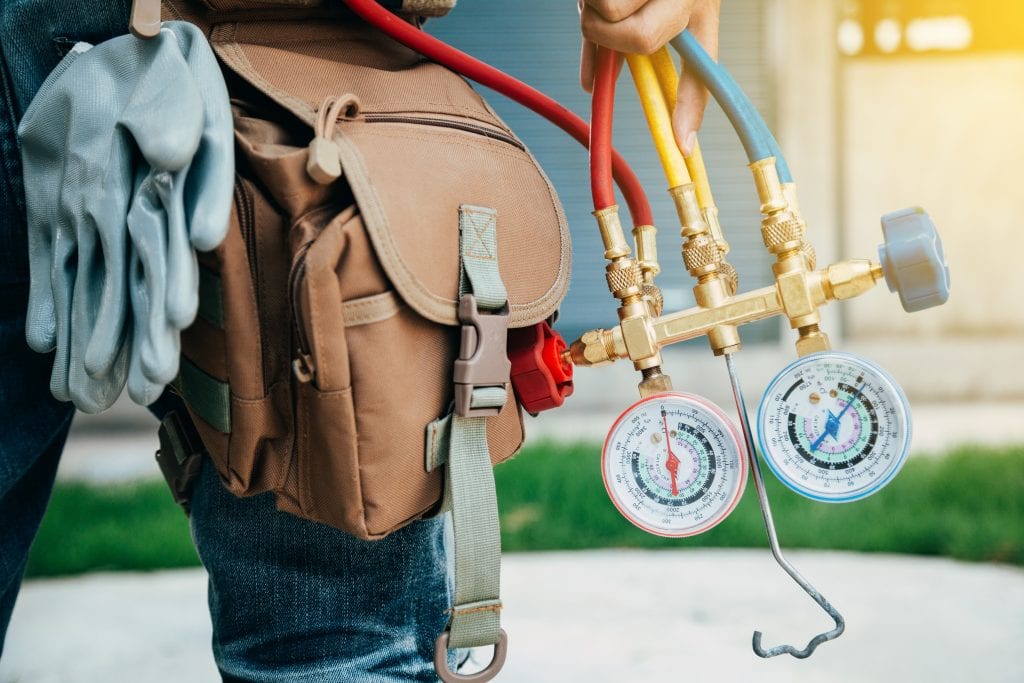If you want to learn how to become an HVAC technician, you’ve come to the right place. Coyne College’s HVAC Refrigeration program will help prepare you for a career in an in-demand profession.
Before we dive into how you can learn all about how HVAC systems work by enrolling in Coyne College’s HVAC Refrigeration program, let’s refresh our memories on what HVAC technicians do.
HVAC technicians are widely skilled trades workers in terms of the skills they use on the job each day.
An HVAC technician’s main duties include installing, maintaining and repairing various indoor climate control systems like furnaces and air conditioners. Each of those tasks is more complex than can be described in this post (that’s where Coyne’s program comes in). Installation, for example, can require HVAC technicians to use some or ALL of these skills:
- Reading blueprints
- Testing electrical components
- Testing tubing and piping
- Using power tools
- Providing great customer service
- And more!
In addition to possessing a variety of skills, HVAC technicians can work in a variety of settings. Such work environments include:
- Homes
- Schools
- Factories
- Office Buildings
Any building that needs heating or air conditioning, whether it’s residential or commercial, has been visited at some point by an HVAC technician.

Their work helps HVAC systems work as well as they can, increasing the quality of life for the building’s occupants. They also help people and companies save money on their electric or natural gas bills, as well as reducing the effect of heating and cooling on the environment.
As mentioned in the open, now is a good time to be getting into the HVAC field. The HVAC technician employment rate is projected to grow by 13 percent through 2028. The continued construction of building and an increased prevalence of service contracts, especially during slow seasons, are reasons for the strong growth rate.
The BLS suggests that the workload for technicians who focus on installation, especially of newer, greener systems, may experience periods of unemployment after initial installation booms. However, service contracts are becoming more common and will help technicians stay working during down periods.
As more and more people continue to need refrigerators, heating systems and air conditioners, the employment future for HVAC technicians should remain healthy.
There are a number of certifications that HVAC technicians can earn that showcase mastery of additional skills. For example, HVAC technicians who work with refrigerants are required to pass an exam administered by the Environmental Protection Agency (EPA). Certifications help make technicians more marketable to contractors and other potential employers.
Before achieving such certifications, most HVAC technicians begin by enrolling in an HVAC training program like the one at Coyne College. HVAC training programs are gaining popularity due to the demand for qualified HVAC professionals.
Speaking of such programs, let’s get to what you can learn as a student in Coyne College’s HVAC Refrigeration program.
Coyne College is a career training institution in Chicago and Chicagoland with a rich history of preparing skilled trades workers to back it up. For more than 110 years, Coyne has offered programs like its HVAC Refrigeration diploma program to set students up for career success.
Coyne College’s HVAC-R program will prepare you to perform the essential functions of an HVAC-R technician, including installing, maintaining and repairing HVAC-R systems in a multitude of settings.
In our program, you gain an in-depth understanding of how HVAC systems work. Our curriculum features instruction on the parts of HVAC systems to help you know them inside and out.
Our experienced instructors will cover HVAC basics with the goal of you understanding HVAC to build a foundation from which to launch your career.
In Coyne College’s HVAC program, you will gain the necessary skills and knowledge to succeed in the HVAC profession. Some of the required courses in the program’s curriculum include:
- Gas Heating
- Commercial Controls and Applications
- Troubleshooting Systems and Installation
- Air Conditioning, Electric Heat and Heat Pumps
- And more!
In the program, you will become well versed in the intricacies of HVAC by learning from experienced instructors who have significant experience in the field. At the end of the HVAC-R program, you will be ready to enter the workforce as an HVAC-R technician and do things like fixing a heating system and performing air conditioning unit repairs.
Our HVAC program is available both during days and at nights to accommodate your busy schedule. The program can be completed in as few as 42 weeks and is offered at our Chicago Loop campus at State and Madison.
At Coyne College, support goes beyond the classroom. As a student, you’ll have the opportunity to take advantage of career assistance resources, including mock interviews and resume help. These resources can help students secure apprenticeships after completing the program.
You’ll also have the chance to take advantage of our extensive network of connections in the field that can help you find employment at the conclusion of their training programs.
At Coyne College, you’ll receive a well-rounded education that will serve as the foundation of your skilled trade career.
What do you say — are you ready to get to work? Heat up your career at Coyne College by visiting https://www.coynecollege.edu/.


